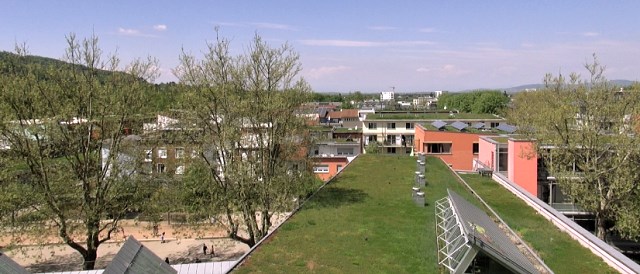How do America’s future environmentalists view Germany’s energy transition? Craig Morris recently spent a day with a group of students from the US and found some things encouraging, others not.

One of the things that impress the group of visitors from North Carolina the most was something generally taken for granted in Freiburg: green roofs. (Photo: Craig Morris)
One of the joys of teaching is, ironically, that you learn so much. So when I gave a lecture to a group of 25 students from North Carolina recently and took them on a brief tour of the Vauban neighborhood in Freiburg, I was curious to see what they knew, what they want to know, and what they thought they knew but didn’t.
The group was a motley bunch studying a broad range of loosely environmental subjects – from public policy to urban planning. Unlike a lot of people who engage with me in comments below my articles and on Twitter, the students did not seem too concerned about the minor uptick in carbon emissions in Germany last year, especially in light of the 25.5 percent decrease from 1990 to 2012. Then again, none of them wanted new nuclear plants in the US (one student was undecided). Because I constantly have to explain the Energiewende to nuclear proponents from the US and the UK, I also have to keep reminding myself that these critics represent a fringe group, not the majority – and not any community that calls itself “environmentalist.”
What didn’t the students from North Carolina know? For instance, that feed-in tariffs pay for all power produced, not just any “excess.” And that the movement has been community-driven for decades.
Mainly, they wanted to know what the US can learn from Germany. I told them that policies differ so much from one state to another in the US that you need consultants to navigate the country. (And as chance would have it, the website with the best overview of state policies is from North Carolina.) What the US needs, I argued, is a national policy for renewables.
“Yeah, and that won’t work in the US,” a student responded. “Of course not,” I sarcastically replied, “because the US is a medial fiefdom, not a democracy that can abolish slavery, give women the vote, ban alcohol, and then revoke that ban.”
It then occurred to me what Americans really need to learn from Germany: you can change things.
Our opponents tend to say, “it may work well for Germany, but it won’t work in Michigan, etc.” Only recently, I asked Michael Sladek, the man behind Germany’s Power Rebels, whether it was easy for his town to buy back its grid in the 1990s. “It was very hard,” he answered, “because we practically had to rewrite the law to do it.” Sladek is a doctor by training. He knows you can’t change the laws of nature. But the laws of man are there to be changed.
So although it was encouraging to meet such a big group of young Americans eager to learn, open to best practices from abroad, and willing to work for a better future, I felt my heart sink when I told them not to lose heart in light of all the things they complained about – dishonesty in US media, big money in politics, etc. How did America reach a point where our future leaders don’t think they can change things for the better?
Craig Morris (@PPchef) is the lead author of German Energy Transition. He directs Petite Planète and is writes every workday for Renewables International.
I know that RI is miserably underfunded, but just wanted you to know that those of us trying to get the UK to engage with the realities of the current energy revolution find your analyses clear, accurate and myth destroying. As a recovering politician, I know how much of an up hill struggle this is turning out to be, but I just wanted to say a big ‘thanks’ for the cool breezes you blow into closed corners of the UK debate.